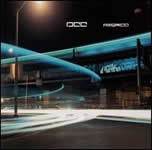|
|
 |
Dusted Reviews
Artist: Death Comet Crew Album: This Is Riphop Label: Troubleman Unlimited Review date: Apr. 1, 2004 |

|
|
|
 |
Death Comet Crew (nee ArenaSexDeath, which thus begat Death Star Crew) existed around the periphery of New York's various scene collisions in the 1980s (see also: disco, no/new wave, etc.), trafficking in a mutilated brand of hip hop that sounds perhaps far stranger by today's standards than it possibly could have at the time of creation. Culled from 1983, This Is Riphop collects the few officially released records by Micheal Diekmann, Shinichi Shimokawa, and principle songwriter Stuart Agabright, along with some live tracks for good measure, assembling a picture of a group who though relatively small in historical stature, still managed to cast a lengthy shadow over the evolution of hip hop.
Because the hip hop canon has always prized the spoken word as much as (if not more than) the work done from the producer's chair, it's relatively easy to see why Death Comet's legacy has resided largely outside the mainstream. Save for the few contributions from Rammellzee (who is also experiencing a resurgence right now, and rightfully so), much of the material contained herein is instrumental, substituting samples from television and movies, white noise, and various other sound effects in place of verbiage. Compounding things further is the fact that much of this material doesn't seem to have stemmed from block parties or reflections of ghetto lifestyle, but rather from the curious intersections of post-punk, no-wave, and disco of the then burgeoning New York downtown that allotted people like Jean-Michel Basquiat their well-deserved 15 minutes of fame. (Along with the aforementioned Ramm, collaborator Phase 2 was a prominent graffiti writer featured in the monumental documentary Style Wars.)
Although in the common parlance of our times references to the four elements of hip hop seem to have fallen from favor (save for obligatory shout outs to all things "back in the day"), there is no denying the fact that Death Comet's music was born of the same impulse that inspired many of the more commonly recognized hip hop pioneers. The discography opens and closes on the same note, featuring two versions of the track "America," both of which successfully mate jackhammer drum machine kicks to scratches and ominous industrial clatter. The end result is an aural portrait that seems as timely in these recession starved times as it no doubt did at the time of its initial release. The disc also collects the group's only official release, the 12” "At the Marble Bar," released some 20 years ago on Beggars Banquet and featuring the prominent vocals of Rammellzee. While the rhymes lay bare the connections between Death Comet's sound world and the then nascent hip hop set, buried beneath are fits and starts of the type of sonic maelstrom the group was capable of, extending into the instrumental sparseness of "Scratching Galaxies." "Exterior Street" is even more malevolent, matching Ramm's paranoid rhymes against white noise explosions and foreboding synths.
The remaining material on the disc is taken mostly from live performances, thus highlighting the essential contributions from DJs High Priest and Ivan Ivan. While the material from the lone single can feel spare at times, these tracks up the ante in terms of overload. In addition to its frightening vocal screams, tracks like "Amphipet" and "DanceMoFo" reveal bits of polyrhythmic intensity, pre-electro beats, and swash of noise guitar that betrays Agabright's roots as a member of the Factory Records-approved Ike Yard. Out of all of these tracks, "A King a Wave Passes" is the best, relying on phasey, distorted guitars in addition to the usual rhythmic underpinnings for a claustrophobic dance-floor shaker.
Comparing the beats contained on This Is Riphop with the ubiquitous urban soundtrack that modern commercial hip hop has become, it’s hard to find a connection between Death Comet Crew's deeply dark sound and the pristinely brightened breaks of those at the top of the charts. But the path that this group began so long ago has found a few followers. Listening to any of El-P's grimy interstellar beats or MF Doom's space oddities (both of whom are professed fans) reveals a group that may not have been so out of place after all. What makes this disc an important study in hip hop – a genre only in its twenties – is the fact that it gives a glimpse at how liberating it must have been at its inception. As mentioned earlier, this disc sounds odder by today's standards because we all know that, sadly, that same "anything goes" mentality has fallen by the wayside in terms of mass appeal, much like Death Comet Crew's entire catalogue. Hopefully this disc will rectify that, showing that the underground has always existed. At the time of its formation, it was just one of many voices struggling to break into the limelight. Maybe now it will have that chance.
By Michael Crumsho
|







